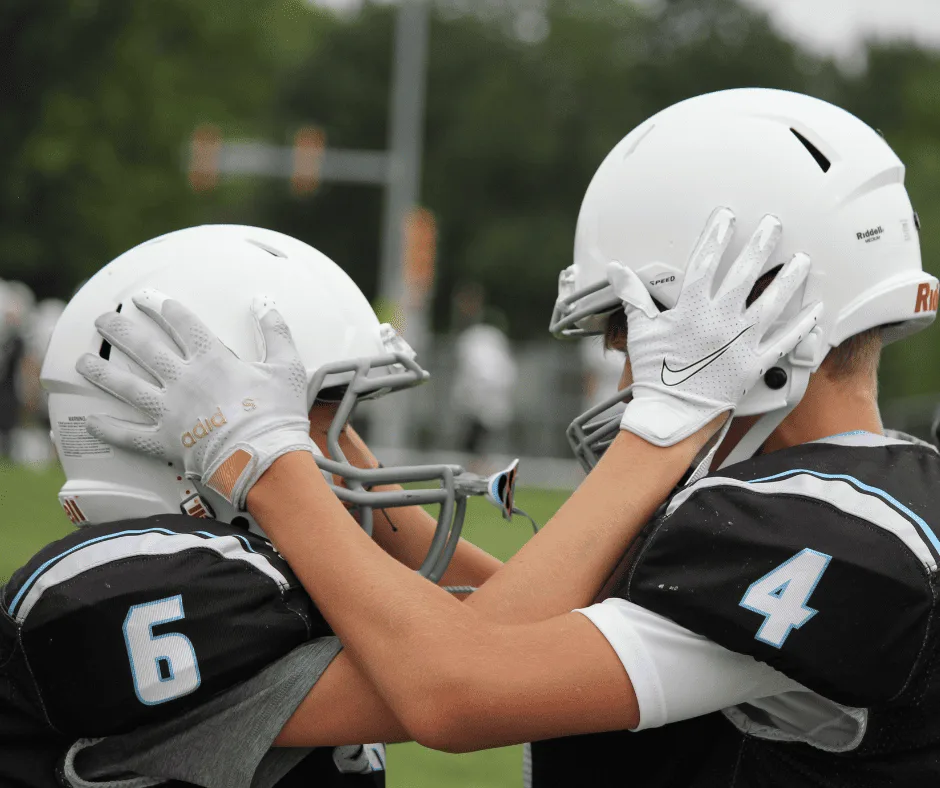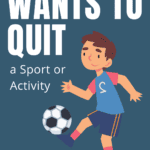It can be challenging for parents to know how to respond when your kid wants to quit a sport or activity – football, wrestling, piano, chess club or whatever they signed up for. Whether you have a teen or a child, it’s important to understand why they want to quit and to respond in this simple way.
My oldest son – the natural people-pleaser- would walk across hot coals if he thought that is what my husband and I wanted. We wonder if he would even tell us if he wanted to quit one of his sports.
On the other hand, my daughter complains from time to time about every activity she is in – even if she truly loves it. She sometimes needs a bit of an encouraging nudge.
Children are constantly growing and evolving, and their interests and desires may change as they discover new passions and strengths.
When your child tells you that they want to quit a sport or activity, it can be tough to know the best way to respond.
Of course you don’t want to teach your child that it is okay to quit the moment things get difficult. However, you don’t want to drag your kid -kicking and screaming- every Tuesday to a swim practice they despise.
Before we talk about a supportive – yet encouraging- way for parents to respond when their child wants to quit something, let’s talk about why some kids quit activities too soon.
Also read: Why Youth Sports can Lead to Narcissism

Related: 5 Things All Sports Moms can Relate to
Underlying Issues Behind Kids’ Desire to Quit
Sports and activities can have numerous benefits for children, including physical fitness, teamwork, discipline, and improved self-esteem. However, it is not uncommon for kids to express a desire to quit participating in sports at some point.
Sometimes though a child likes a sport, there fixable reasons why they may want to quit, such as:
- Too much pressure – if your child feels that the sport or activity is causing more stress than fun, they may start to pull away or desire to quit.
- Physically demanding– while some kids thrive on physical exertion, not all do. If the sport or activity is too demanding or causing injuries, your kid may want to ultimately quit.
- Burn out – if your kid feels that this activity has been taking up too much time or is pulling them away from friends they may lose interest.
- Social concerns – did one of their friends quit? Is someone bullying them at practice?
- Lack of confidence – does your child feel they aren’t good at the sport or activity? Are they sitting the bench a lot? They may need some extra support or practice.
If a child still enjoys an activity or sport but complains of one of these issues, balance often the best answer.
Is there an alternative option- such as a less intense team or taking a week/season off?
Talking openly and honestly to your child is the best way to help guide them.
Of course, sometimes a child is flat out uninterested in an activity, it causes more harm than good, or they truly are ready to say goodbye to it.
This can be hard for a child to nail down. Similarly, as a parent you may feel torn between forcing them to “stick it out” and do something they hate verse allowing them to quit and throw away a life lesson in perseverance.
Luckily, there is a simple way for parents to help their child who desires to quit.
Related: 5 Ways Girls Benefit from Sports

Quit on a Good Day
Sports and competitive activities are full of ups and downs.
A win may feel like the top of a roller coaster – adrenaline, love and appreciation.
Then, a loss may feel like a deep low – rejection, pain, and regret.
While this is the beauty of sports (the losses make the wins so sweet), kids often decide to quit based on a bad day. For example, after a big loss, a tough game, or not making an “A” level team.
When your kid wants to quit a sport, tell them this simple rule:
“You can quit. But, you have to wait until a good day.”
With this simple phrase, you are telling your child you support them and their decision while you are encouraging them to persevere through obstacles in life.
If they are mid-season, allow them to make the decision while still having them push through the season they signed up for (if possible).
Read: Kids who Give up Easily Need to Hear this

The Problem with Youth Sports
Unfortunately, parents often get so wrapped up in sports and activities, and the child feels trapped.
The child is terrified to let their parent down because they realized that this youth sport is actually their parent’s passion.
Children need to believe that there is more to your relationship than sports. They need to feel that your love for them doesn’t rely on how well they played or if they sign up next season.
Find a hobby that doesn’t have to do with sports. Try fishing, crafting, read books, go to church, cook dinner together, play video games, watch movies – or any of these anchor routines!
Also read: How Parents Ruin Youth Sports
Final Thoughts On How to Handle When Your Kid Wants to Quit
My favorite thing to do is watch my son wrestle. We invest a lot of time and money (so much money!) into his hobby. If he told me tomorrow that he wanted to quit -if I am being totally honest – I’d be devastated.
However, we ask him these questions often:
- Do you still get excited to go to practice?
- Do you need a break?
- Is it holding you back from anything else you want to do?
He knows that we support his decision making processes, but we also make it clear how proud we are to see him battle through the bad days
And if he ever told us he wanted to quit, we’d talk through why he feels that way and if there are other alternatives to completely quitting.
Then, if he was still leaning towards quitting we’d tell that is fine. But to wait to make that final decision after a good day of wrestling.
For more tips on raising kids who are healthy at home and strong in the world, follow us on Facebook.
You may also like: Are we Raising the Weakest Generation Yet?

